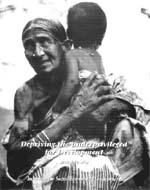Beyond progress
 compulsory acquisition of land by public and private sector companies often displaces people, forcing them to give up their homes, assets, means of livelihood and even vocation. More often than not, the affected families are driven towards poverty a state of relegation, loss of livelihood and destitution. The presumption that displacement is an inevitable consequence of all development efforts needs to be reassessed in the light of the enormous cost of human suffering of such projects.
compulsory acquisition of land by public and private sector companies often displaces people, forcing them to give up their homes, assets, means of livelihood and even vocation. More often than not, the affected families are driven towards poverty a state of relegation, loss of livelihood and destitution. The presumption that displacement is an inevitable consequence of all development efforts needs to be reassessed in the light of the enormous cost of human suffering of such projects.
These projects uproot thousands of people through submersion of their lands, acquisition of their properties for project sites or change of land-use patterns of the affected lands. Most of them become migrant labourers or urban slums dwellers.
Apart from depriving them of their only asset, displacement leads to other traumatic psychological and sociocultural consequences. Those affected often end up as beggars, vagrants and prostitutes.The need to avoid such large-scale displacement, particularly of tribals, and in cases of unavoidable displacement, their comprehensive resettlement and rehabilitation ( rr ), has become one of the central issues of the development process itself.
Depriving the Under-privileged for Development delves into the problems of displacement in Orissa during the period 1950 to 1994. Projects relating to industrial mining, thermal power and dams in this eastern state caused large-scale displacement. For instance, Hirakud and Rengali dams displaced more than 1,30,000 people, whereas 38 other medium irrigation projects displaced about 35,000 people from 210 villages.
In the absence of 'land for land' deal, there was a marked decline in ownership of land. Compensation money was insufficient for procuring land. With the sudden increase in demand for land, prices of land shot up. Amount paid as compensation was far less than the market price of land. Moreover, illiterate tribals spent most of the cash on immediate consumption. The scenario was further aggravated by the fact that those who were enjoying usufructuary rights based on customs and traditions or doing shifting cultivation were denied compensation.
In the absence of grazing land and sufficient water in the new settlement areas, displacement also resulted in reduction of the number of livestock. Resettlement colonies had very little housing land which resulted in over-crowding, loss of pri-vacy and proper sanitation. Many productive activities which womenfolk carried out, such as kitchen gardening, livestock rearing, fishery or poultry, got disrupted. Another adverse effect that displacement heralded was the trend of early marriage of girls. This was largely due to the fact that what was received as compensation was spent in getting their daughters married.
The author suggests a number of measures to save those displaced from pauperisation:
• Increase their participa tion in implementation of dis- placement-related activities.
• Project must ensure just and timely payment of compensation money and rehabilitation assistance.
• Land for land is considered to be the most viable option in any rehabilitation policy.
• In an irrigation project, affected people should be accorded first priority in getting land in the command area of the project.
• Skill upgradation programmes should be undertaken by the project so those displaced are able to find meaningful jobs.
• Sixty per cent of the unskilled and semi-skilled jobs under the project should be earmarked for the affected families.
Absence of a well defined government policy is one of the bottlenecks in implementing rehabilitation and resettlement programmes. It is understood that such a policy is now on the anvil and will be soon put up before the Bharatiya Janata Party ( bjp) government for clearance.
The involvement of social activists and non-governmental organisations in the implementation of this policy should not only reduce the trauma caused by displacement, but should also make new projects a win-win situation for all concerned.
Related Content
- Africa environment outlook for business
- Renewables 2023 global status report: economic and social value creation
- Beyond the stocktake (Part II): clean energy technologies:
- A world in crisis, a world in progress: growing better together
- Decarbonisation in the global steel sector: tracking the progress
- Mid-term evaluation of the implementation of the Strategic Action Plan on Polio Transition (2018-2023)- Volume 1: Report
